Essential Oil Diffuser Guide
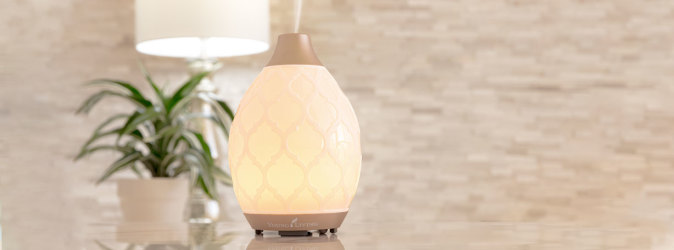
Essential Oil Diffuser: What Is It?

How does an essential oil diffuser work?
Essential oil diffusers work by creating a steam vapour that is scented with the essential oil or blend of your choosing. Some diffusers have you add a few drops of the essential oil to the water itself. Others have absorbent scent pads where you apply the essential oils. With both of these types of diffusers, the scent of the essential oil ends up in the steam, which isn't hot and doesn't pose a risk of burning. The steam is then dispersed into the room.
What does an essential oil diffuser do?
Simply put, an essential oil diffuser takes a few drops of essential oil and disperses it into a fragrant steam that is then released through the top or side of the diffuser. It allows you to get the inhalation and aromatic benefits of essential oils without having to apply them topically. Essential oil diffusion in this manner may be effective in promoting overall feelings of well-being for a more satisfying lifestyle.
Choosing a Diffuser
- Where you plan to use the diffuser
- Whether you will use it in one dedicated space or want to be able to move it around
- The size of your space
- How it needs to be cleaned
- Your budget
Are all essential oil diffusers the same?
While all diffusers have the same purpose of creating fragrant mist or cool steam and dispersing it into your space, some models may work differently or offer more functionality. Here are a few of Young Living's most popular diffusers and their benefits:
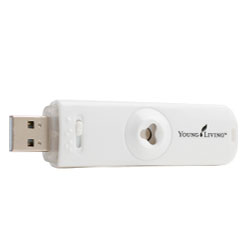
Designed with convenience and portability in mind, this diffuser is perfect for packing in your briefcase or backpack for on-the-go diffusing. Use it with your laptop or in your car, or bring it along when you travel. It’s mobile, compact and silent, with 10-second, 30-second or 60-second diffusion interval settings.
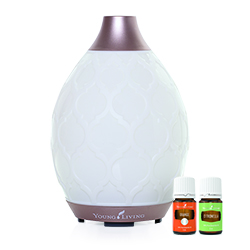
This full-size diffuser can deliver up to 8 hours of continuous diffusing on Low mode; and its High setting is suitable for larger rooms that need a higher level of output. This model also has several light settings, including a flickering mode designed to mimic candlelight to help promote a soothing atmosphere.
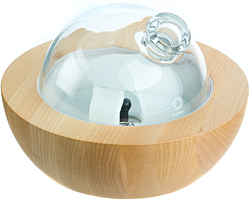
This remote-controlled model blends modern and traditional aesthetics, with an adjustable glass dome and a solid maple base. Its functionality includes pre-set relaxing sound options and the ability to connect to your device to access your playlists.

A great entry model for those just getting started with diffusing essential oils, Feather The Owl diffuser is easy to use, Feather the Owl features multiple diffusion from low to high, 10 different LED light options and 5 white-noise sound options.
Check out our diffuser range here
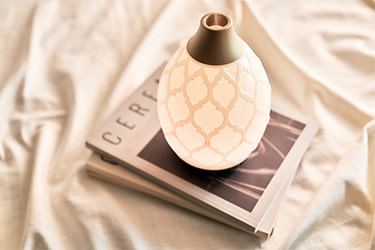
How many drops of essential oil do you use in a diffuser?
The number of drops of essential oil you use in a diffuser depends on the well capacity, which is how much water the diffuser is designed to hold and individual oil label directions. Most full-size diffusers can accommodate anywhere between 5 and 12 drops of essential oil in a full well, but travel-size or mini models may just need 1 or 2 drops. Scent pad diffusers, such as Young Living's Car Vent Diffuser, only need 2 to 3 drops of oil.
Where should I put my essential oil diffuser?
You can put your essential oil diffuser virtually anywhere you want to add a bit of fragrance and style to your space. If you're using a diffuser around pets or children, make sure to diffuse in an open, well-ventilated space.
How long do essential oils last in a diffuser?
The essential oils will last as long as it takes for the well to run out of water. Even after that, the scent of the oil often lingers for quite some time in the air. This is one reason it's important to use the smallest amount of essential oil that provides the desired level of fragrance and benefits.
Can I use tap water in my diffuser?
Depending on the type of diffuser you are using, you may be able to use water straight from the tap. The Dewdrop diffuser model can take tap water. Always check the instructions on your diffuser before adding water, as some diffusers may get buildup that can hamper use with tap water, particularly if the water in your area is known to be high in minerals.
Should I use distilled water in my diffuser?
Yes, you can use distilled water in your diffuser. Many diffusers specifically state that they can only be used with distilled, purified or filtered water, but using distilled water is also safe for a diffuser that can use tap water unless otherwise specified.
How to Clean a Diffuser
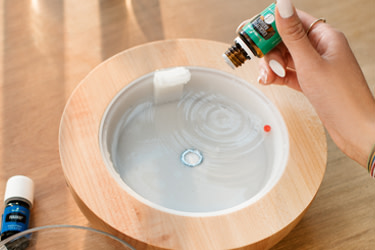
How do I clean my diffuser?
How to clean your diffuser will depend on the type of diffuser and the model. There should be cleaning instructions in the booklet that accompanies the diffuser. In general, cleaning a diffuser involves emptying it of any remaining water, wiping out and rinsing the water reservoir well to remove any oil residue and then letting it air-dry before the next use. It's not generally advised to use any type of conventional cleaner in your diffuser.
Diffuser Safety Tips and Considerations
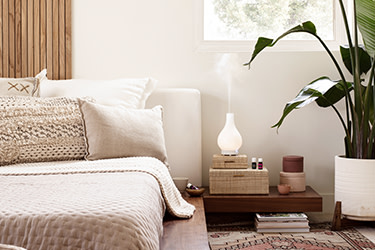
How long should I diffuse oils?
How long you should diffuse an oil depends in part on which oils you are using, how big your space is and the output of your diffuser. Some very basic oils like Lemon and Peppermint may be able to be diffused for longer amounts of time at low levels of output, but the general recommendations are to limit diffusing sessions to 30-60 minutes, depending on the oil. More intense oils such as Eucalyptus may need to be limited to 20-30 minutes per session. If you feel the scent is too intense or have any negative reactions or side effects, stop diffusing the oil and take a break.
Can you leave a diffuser on overnight?
While it's not recommended to diffuse essential oils overnight, you could leave a diffuser with plain water going overnight if you wish. Make sure it has a large enough reservoir to continue diffusing for that length of time. Some diffuser models also have sound or light functions that can be helpful at night.
Can diffusing essential oils be harmful?
Essential oils are natural products, but they can be very powerful. For most people, essential oils are a safe way to support an overall healthy lifestyle, but certain safety aspects should be taken into consideration. If you have allergies to any type of oil or flower, it's important to avoid that essential oil, blends that may contain that oil and plants in the same family. For example, if you are allergic to daisies, chamomile may also be a trigger substance for you. If you have any kind of medical issue or are on prescription medications, you should check with a health care professional who is familiar with essential oils before adding them to your routine. Those who are pregnant or breastfeeding should also exercise caution when using certain essential oils. If you are using a new oil, introduce it slowly by diffusing at low quantity for a short amount of time in an open, well-ventilated space.
Can I diffuse oils around children and pets?
The benefits of diffusion can extend to children and pets, but it's important to keep in mind their more sensitive systems. When diffusing essential oils around children and pets, limit diffusing times to 20 to 30 minutes per session. It's also a good idea to diffuse in an area that pets or children can leave if the scent gets too intense.
Conclusion
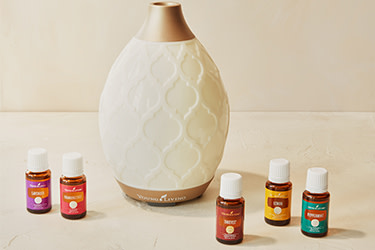
Contact Us
Young Living Europe B.V.
Peizerweg 97
9727 AJ Groningen
Netherlands
Young Living Europe Ltd Head Office
+44 (0) 20 3935 9000
Copyright © 2021 Young Living Essential Oils. All rights reserved. | Privacy Policy
CLICK HERE : See what we are doing in response to the COVID-19 pandemic
